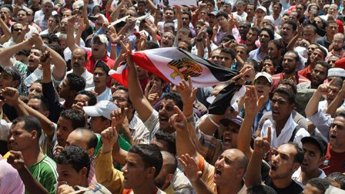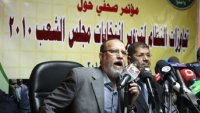News, July 2011
www.aljazeerah.info
Archives
Mission & Name
Conflict Terminology
Editorials
Gaza Holocaust
Gulf War
Isdood
Islam
News
News Photos
Opinion Editorials
US Foreign Policy (Dr. El-Najjar's Articles)
|
Editorial Note: The following news reports are summaries from original sources. They may also include corrections of Arabic names and political terminology. Comments are in parentheses. |
Egyptian Protesters in Squares Chanting "Revolution First," Not Any Other Issues
July 8, 2011
Editor's Note:
The Arab media, particularly TV stations, have shown Egyptians coming out today filling the Tahrir Square in Cairo and Squares of other cities, particularly Suez and Alexandria. This was in response to calls from most parties and organizations of the Revolution. The objective is telling the ruling "Military Council" that they are unhappy about delaying the trials of Mubarak and his senior aids.
The main slogan of today's protest is "Revolution First," not any other issues that have distracted the people in the previous months, such as the coming elections and the Constitution.
Egyptians want to see trials of Mubarak, his aids, and senior police officers who are responsible for the deaths and injuries during the first two weeks of the revolution. They want to see this happen before the coming elections.
***
Protesters gather in Tahrir square for new ‘Day of Anger’

Nearly five months after the downfall of Hosni Mubarak’s regime, thousands of Egyptians converged on Cairo’s Tahrir Square on Friday to urge the nation’s new military rulers to speed up democratic reforms.
By Charlotte BOITIAUX (text)
Nearly five months after former president Hosni Mubarak was ousted in a popular revolt, thousands of Egyptians descended on Cairo’s iconic Tahrir Square on Friday to urge the nation’s new military rulers to speed up the democratic reforms they have promised.
“Everyone has been talking about this event for a month,” said Sonia Dridi, FRANCE 24’s correspondent in Egypt. “We are expecting a massive rally of young people, old people and activists from across the political spectrum.” Rallies on “Persistence Friday” are planned all over the country, but Tahrir Square promises to be a flashpoint.
Dridi says that the demonstrators will all be calling for the same thing: a speeding up of the country’s transition to democracy. “People are tired of waiting for change,” she said.
“The biggest demand is for what we originally took to the streets for in January,” said Alfred Raouf, an Egyptian political activist on FRANCE 24’s Live from Paris show Thursday night. “It’s justice, the end of corruption, and dignity. The problem now is that after all these months we still have a very corrupt ministry of interior and a very corrupt police force.”
Many Egyptians complain that while officials from the former regime have not yet faced justice, the trials of civilians before military courts are on the increase. In an April report, Human Rights Watch estimates that the Supreme Council of the Armed Forces has tried more than 5,000 Egyptian civilians before its tribunals since Mubarak was ousted in February, many of them protesters detained during the demonstrations earlier this year.
“The trials [of senior officials] are taking way too long while the activists arrested from the streets during demonstrations are having military trials where they are judged within three days,” said Raouf.
Many Egyptian activists are pushing for their demands on the Web. The Coalition of Youth Revolution, a group that was instrumental in organising the revolt against Mubarak, calls on its Facebook page for an immediate end to the country’s state of emergency – in place since 1981 – and the “cancellation of special courts and martial law”. The Facebook page for We are all Khaled Said, an activist group named after a young man killed by police in Alexandria in 2010, appeals for an end to government corruption and says Friday’s protests will call “for the demands of the [Egyptian] revolution to be met, and quickly”.
Army becomes target
In the past week, new clashes between police and protesters have been spreading across the country. Cairo’s Tahrir Square, which became something of a Mecca for anti-government protests earlier this year, saw more unrest on June 28 when some 4,000 demonstrators clashed with police. Violence also erupted in Suez in north-eastern Egypt on Wednesday after the release on bail of several police officers accused of killing demonstrators during the uprising against Mubarak.
In a bid to defuse the mounting anger, the interior ministry on Wednesday announced that hundreds of high-ranking police officers will be sacked for their role in the harsh crackdown on demonstrators earlier this year that left nearly 850 people dead.
Meanwhile, an Egyptian prosecutor on Thursday charged 25 Mubarak-era officials – including the speakers of parliament’s two chambers – with manslaughter, attempted murder and assault for their part in organising a February 2 attack on demonstrators in which assailants on horses and camels charged into crowds.
The army, once praised for its role in the popular revolt, is now the target of criticism.
“The army is outdated, it is not accustomed to the people challenging its authority,” says Mahmoud Hussein, an Egyptian writer and political scientist. “It is absolutely legitimate that the Egyptians are impatient, but one must allow more time for the deeper changes. It’s a new situation, and a complicated transition.”
Muslim Brotherhood to join demonstrations
After three decades of Mubarak’s reign, Egyptians are debating the form and nature of democratic transition in the world’s most populous Arab nation, with divisions emerging between secular activists and the Muslim Brotherhood, the country’s best-organised political group.
While secular activists and civil society groups are pushing for a new constitution before parliamentary elections are held, the Muslim Brotherhood would like to see parliamentary elections held before a new constitution is put in place.
Analysts maintain that a tight election timetable will not give new parties enough time to prepare and build up support against the Islamist group, which has a grassroots network across the country.
The Muslim Brotherhood had initially declined to participate in Friday’s demonstrations when the goal was to pressure Egypt’s military council to delay parliamentary elections scheduled for September.
But following a change in the objectives of the protest, when organisers dropped their demand for delayed elections, the Brotherhood announced on Wednesday that they would participate.
“Their presence is likely to bolster the demonstrations,” Dridi says. “And they cannot afford to miss this great moment of national unity against the remnants of the Mubarak regime, which was their long-time political opponent.”
Date created : 07/07/2011
Fair Use Notice
This site contains copyrighted material the use of which has not always been specifically authorized by the copyright owner. We are making such material available in our efforts to advance understanding of environmental, political, human rights, economic, democracy, scientific, and social justice issues, etc. We believe this constitutes a 'fair use' of any such copyrighted material as provided for in section 107 of the US Copyright Law. In accordance with Title 17 U.S.C. Section 107, the material on this site is distributed without profit to those who have expressed a prior interest in receiving the included information for research and educational purposes. For more information go to: http://www.law.cornell.edu/uscode/17/107.shtml. If you wish to use copyrighted material from this site for purposes of your own that go beyond 'fair use', you must obtain permission from the copyright owner.
|
|
|
|
||
|
||||||
.jpg)



